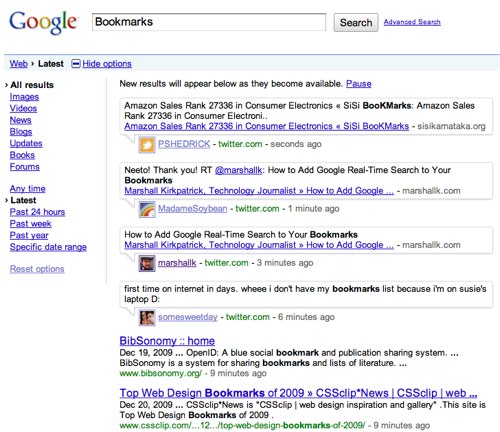I was just looking over the archives of my most recent ReadWriteWeb articles and noticed there were a number of them I was quite proud of in January. I decided to highlight them here, in case you’d like to see any you missed.
I wrote 40 articles last month on ReadWriteWeb and these are the ten that I’d be most disappointed about seeing just roll down the stream to be forgotten about. I hope you find a few you missed but enjoy a second chance to check out.
Yeah, a bunch of them are about privacy on Facebook. But there are a number that aren’t about that at all!
Welcome to the Age of Robot Reporters
One hour ago, three emergency vehicles responded to a report of an unconscious person at the world headquarters of Nike Inc. in Portland, Oregon. How do I know? An automated form-pumping robot from startup company Nozzl Media told me.
Facebook’s 1st CTO Launches His Next Company (Screen Shots)
Adam D’Angelo was a programming genius who knew Facebook founder Mark Zuckerberg in high school, became the young company’s first CTO and has just begun to unveil his new startup company, Quora. Built by D’Angelo and a team of crack young engineers, Quora is a real-time enabled Q&A site. The company calls itself “A continually improving collection of questions and answers.”
How Chris Messina Got a Job at Google
Chris Messina grew up in New Hampshire, the Live Free or Die state. As a high-schooler in the early 90’s he held his school’s website hostage after being suspended for running an ad on it for a controversial gay rights group. Now Chris is nearing 30, today was his 29th birthday, and he just announced that he’s taken a job at one of the biggest, most powerful corporations in the world.
Why Facebook is Wrong: Privacy is Still Important
Facebook founder Mark Zuckerberg told a live audience this weekend that the world has changed, that it’s become more public and less private, and that the controversial new default and permanent settings reflect how the site would work if he were to create it today. Not everyone agrees with his move and its justification.
PowerOne: This iPhone App Builds iPhone Apps
Elia Freedman used to have it made. He was a mobile app developer in the days of the Palm Pilot and he scored bundling deals that got his sophisticated calculator software into the hands of more than 15 million people. Differentiating his product from competitors “wasn’t something we had to deal with for years,” he says, because of the favored position his app got in pre-loaded bundles.
Now those days are gone.
The Facebook Privacy Debate: What You Need to Know
Facebook changed the world by helping 350 million people publish their thoughts, feelings, comments, photos, videos and shared links much more easily than ever before. It’s the King of social networking.
The network grew with a big promise of privacy at the center of what it offered: your information was by default visible only to people you approved as friends. In December that changed, in a fundamental way. We offer below a summary of the changes that were made and key highlights from the debate that’s raging around the world about privacy, public information and Facebook. Given the role that Facebook plays in so many of our lives, this is high-stakes stuff.
Why is Google Afraid of Facebook? Because Social Networking Could Soon Pass Search
It’s often said these days that Google and Facebook are major rivals, but how could that be if one is in search and the other, social networking? Traffic analyst firm Hitwise provided one very clear clue tonight when it published new numbers for web user activity in Australia. For perhaps the first time ever, social networking sites have surpassed the traffic search engines receive, Hitwise says. There is reason to question the company’s categorization of web traffic, but the trend is worth examining none the less.
The Era of Location-as-Platform Has Arrived
The mobile location “check-in” is fast becoming the hot new status message type online. It was only a matter of time until “where you are” became a platform to build added value on top of just like “who you know” has on social networking sites like Facebook.
Canadian newspaper chain Metro announced today that it has launched a deal with location-based social network Foursquare that will deliver location-specific editorial content from the paper’s website to users’ phones when they check-in near a spot Metro has written about before. The potential for services like this is huge.
Westboro Baptist Church to Picket Twitter Headquarters
The Westboro Baptist Church, home of the best known anti-gay protest organization in the US, led by Pastor Fred Phelps, has a new target for its public outcry. This Thursday afternoon the organization will be picketing outside the San Francisco headquarters of Twitter.
Privacy, Facebook and the Future of the Internet
Today is the 3rd annual international Data Privacy Day and a whole bunch of companies are listed on the organization’s website as participants. Google, Microsoft, even Walmart. Facebook is not listed as a participant and has stirred up a lot of controversy with changes to its privacy policy lately.
Thanks for checking those out. I hope you’ll come join me over on ReadWriteWeb where I write every day and every day try to write something I can be proud of.


